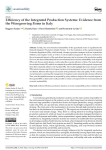Sardaro R., Panio D., Chmielinski P., La Sala P. (2024). Efficiency of the integrated production systems: evidence from the fgrowing Firms in Italy. Sustainability, 01/06/2024, vol. 16, n. 11, p. 4726.
https://doi.org/10.3390/su16114726
https://doi.org/10.3390/su16114726
| Titre : | Efficiency of the integrated production systems: evidence from the fgrowing Firms in Italy (2024) |
| Auteurs : | R. Sardaro ; D. Panio ; P. Chmielinski ; P. La Sala |
| Type de document : | Article |
| Dans : | Sustainability (vol. 16, n. 11, June 2024) |
| Article en page(s) : | p. 4726 |
| Langues : | Anglais |
| Langues du résumé : | Anglais |
| Catégories : |
Catégories principales 06 - AGRICULTURE. FORÊTS. PÊCHES ; 6.4 - Production Agricole. Système de ProductionThésaurus IAMM SYSTEME DE PRODUCTION ; EFFICACITE ; DURABILITE ; GESTION INTEGREE ; VITICULTURE ; ITALIE |
| Résumé : | In Italy, the environmental sustainability of the agricultural sector is regulated by the National Integrated Production Quality System. It is the foundation of the regional Integrated Production Regulations (IPRs), which identify voluntary agronomic strategies on the use of pesticides, fertilisers, and irrigation water, as well as on soil and plant management. The aim is a reduction in the environmental impacts of the agricultural processes and an increase in the production quality. However, the direct relationship between environmental and economic sustainability of the regional IPRs is not obvious and its absence could weaken the economic efficiency of firms. The study, through the stochastic frontier (SF) method, investigates the possible inefficiencies of the regional winegrowing firms that voluntarily adhere to the Apulian IPRs. The results highlight that some measures in the IPRs aimed at preserving the local agroecosystems (soil management and use of resistant varieties) are efficient, therefore allowing for an increase in the production value and quality. On the contrary, crucial measures concerning the management of irrigation water and pesticides decrease efficiency. Thus, more thoughtful measures are requested by policy makers to improve the economic impacts of the regional IPRs on firms and to make possible a certain convergence between environmental and economic sustainability. |
| Cote : | En ligne |
| URL / DOI : | https://doi.org/10.3390/su16114726 |







